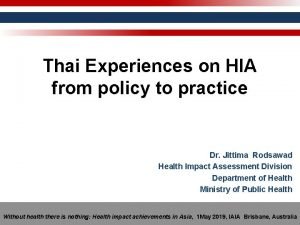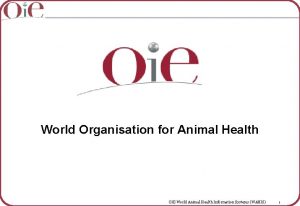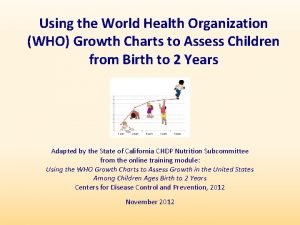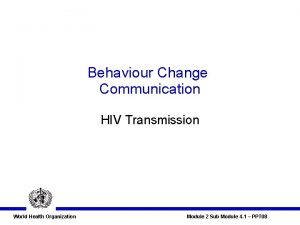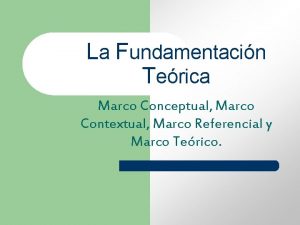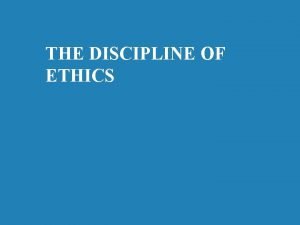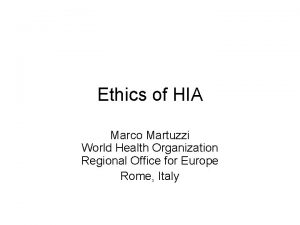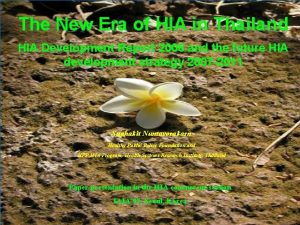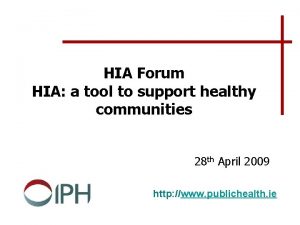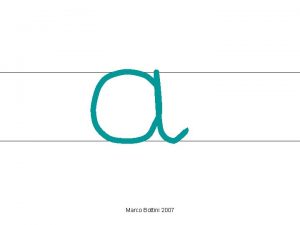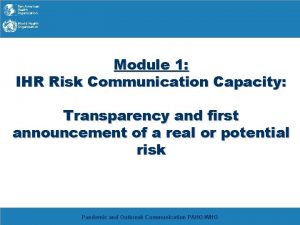Ethics of HIA Marco Martuzzi World Health Organization











- Slides: 11

Ethics of HIA Marco Martuzzi World Health Organization Regional Office for Europe Rome, Italy

Ethical values in HIA • Solidarity, equity, participation, sustainability, ethical use of evidence, … • Routinely referred to in textbooks and training • Some more clarity may be needed

HIA: making decisions • Key goals – Assessing measurable impacts (and minimize them) – Promote equity – Involve / Listen / Empower Possible conflict between these goals

Environmental factors

Minimizing impacts • Overall measurable impact; the most good for most people (EIA, risk assessment, community preventive medicine) • Utilitarian ethical framework, i. e. based on “utility function” = overall impact

ELF and childhood leukaemia: Attributable risk in Italy

Ethical frameworks • The utilitarian framework conflicts with other ethical frameworks • Typically, in HIA “environmental justice” type ethics applies • However, factors other than overall impact can be included in utility function • Equity (distributional issues) are a good candidate • A utilitarian HIA?

NO • HIA, env justice, etc belong to deontological theories (as opposed to utilitarian theories) • People should not be treated as means to and end • Some actions are right or wrong, regardless of consequences • However, the principle of utility has lead to important PH progress, e. g. to immunisation (communitarian ethics)

What deontological ethical framework? • Assessing measurable impacts (and minimize them) • Promote equity • Involve / Listen / Empower • Conflict of aspirations, and ethical systems

Principle-based approaches • Beneficence (Assessing measurable impacts and minimize them) • Non maleficence (ditto) • Justice (Promote equity) • Authonomy (Listen / Empower) These principles “do not provide a full philosophical justification for decision making … where there is conflict it may be necessary to choose between them or assign greater weight to one” (Coughlin 2006)

Conclusions • HIA ethics not utilitarian • Difference with utilitarian approaches such as risk assessment is irreducible • Utilitarian approach has some advantages, lost in HIA • The ethical framework of HIA is not always clear • Should it be clarified? • Perhaps principle-based approaches good candidate if progress is sought
 Marco martuzzi
Marco martuzzi Hia in thai
Hia in thai Health promotion and maintenance
Health promotion and maintenance World animal health information system
World animal health information system World health organization growth charts
World health organization growth charts World health organization
World health organization World health organization photos
World health organization photos Marco referencial contextual
Marco referencial contextual Descriptive ethics vs normative ethics
Descriptive ethics vs normative ethics Normative ethical questions
Normative ethical questions Micro ethics definition
Micro ethics definition Descriptive ethics vs normative ethics
Descriptive ethics vs normative ethics

